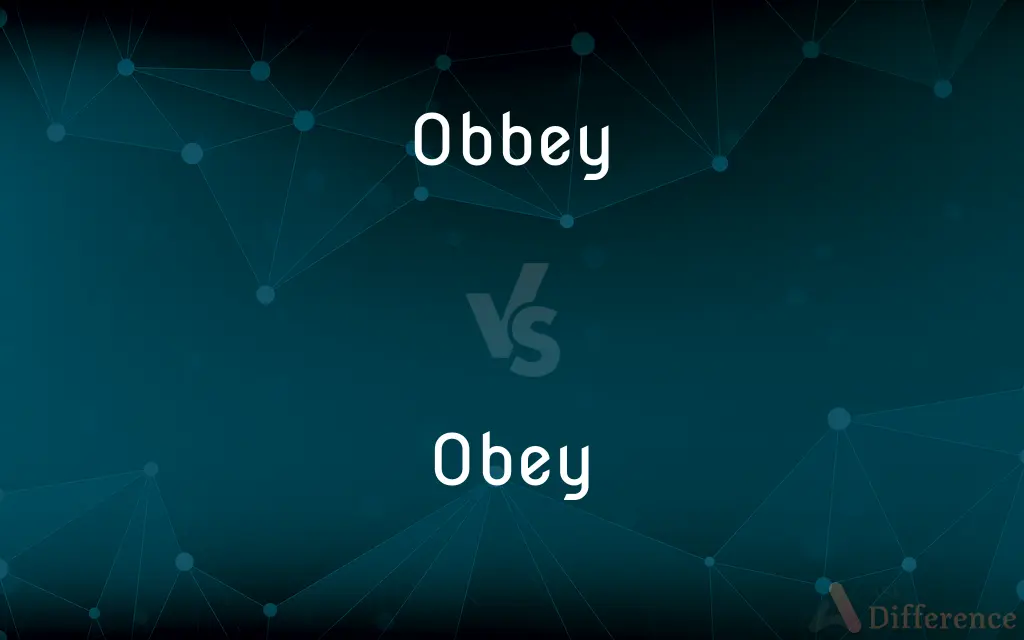Obbey vs. Obey — Which is Correct Spelling?
Edited by Tayyaba Rehman — By Fiza Rafique — Updated on April 2, 2024
"Obbey" is the incorrect spelling, while "Obey" is the correct spelling, denoting compliance with orders or requests.

Table of Contents
Which is correct: Obbey or Obey
How to spell Obey?

Obbey
Incorrect Spelling

Obey
Correct Spelling
ADVERTISEMENT
Key Differences
Recall that "obey" has a single 'b' just like "obtain" or "object."
Envision "obey" as a shorter, simpler command, hence fewer letters.
Remember the phrase: "Only one barrier (b) to obey."
Think of "obey" as starting with "ob-" which is a common prefix.
Utilize spellcheck tools which will often catch and correct "obbey."
ADVERTISEMENT
How Do You Spell Obey Correctly?
Incorrect: Children should obbey their parents.
Correct: Children should obey their parents.
Incorrect: It's important to obbey the law.
Correct: It's important to obey the law.
Incorrect: The soldiers failed to obbey the command.
Correct: The soldiers failed to obey the command.
Incorrect: Pets need to be trained to obbey basic commands.
Correct: Pets need to be trained to obey basic commands.
Incorrect: You must obbey the rules of the game.
Correct: You must obey the rules of the game.
Obey Definitions
To act in accord with someone's wishes or instructions.
The dog obeys its master's command.
To comply with commands, restrictions, or rules.
Soldiers are trained to obey their superiors.
To respond favorably to a command.
The machine obeys the remote's input.
To yield to specific authoritative advice.
He obeys the doctor's advice strictly.
To carry out or fulfill the command, order, or instruction of.
To carry out or comply with (a command, for example).
To behave obediently.
(transitive) To do as ordered by (a person, institution etc), to act according to the bidding of.
(intransitive) To do as one is told.
To be obedient, compliant (to a given law, restriction etc.).
To give ear to; to execute the commands of; to yield submission to; to comply with the orders of.
Children, obey your parents in the Lord.
Was she the God, that her thou didst obey?
To submit to the authority of; to be ruled by.
My will obeyed his will.
Afric and India shall his power obey.
To yield to the impulse, power, or operation of; as, a ship obeys her helm.
To give obedience.
Will he obey when one commands?
His servants ye are, to whom ye obey.
He commanded the trumpets to sound: to which the two brave knights obeying, they performed their courses.
Be obedient to
To behave according to a principle or law.
Magnets obey the laws of physics.
Obey Meaning in a Sentence
Children learn to obey their teachers in school for a structured learning environment.
Citizens are expected to obey the laws of their country.
To maintain order, soldiers are taught to obey orders without hesitation.
In many cultures, it is taught to obey one's elders as a sign of respect.
The dog was trained to obey its owner's commands immediately.
Drivers must obey traffic signals to ensure safety on the roads.
It's crucial for employees to obey company policies.
Animals in the wild do not obey human rules, acting purely on instinct.
To obey means to follow the instructions or commands of someone or something.
Pilots must obey air traffic control commands to ensure the safety of flights.
In a democracy, leaders also must obey the constitution and the will of the people.
During emergency evacuations, it's vital for everyone to obey safety instructions.
Mariners are trained to obey maritime laws strictly to prevent accidents at sea.
Spiritual or religious practices often involve teachings on how to obey divine or moral laws.
In team sports, players often need to obey the strategy outlined by their coach.
To successfully complete a software installation, users should obey the setup instructions.
Obey Idioms & Phrases
To obey blindly
To follow orders without any thought or question.
It's dangerous to obey blindly without understanding the consequences.
Obey the law
To act in accordance with legal statutes and regulations.
As citizens, we are obliged to obey the law to maintain social order.
Obey commands
To follow orders or instructions given by someone in authority.
The success of the operation depends on the unit's ability to obey commands promptly.
Obey your thirst
A phrase encouraging people to satisfy their desires or needs, popularized by a soft drink advertising campaign.
Whenever you feel parched, obey your thirst and drink water.
Obey the call
To respond to a request, command, or duty.
He decided to obey the call to serve his country.
Obey the speed limit
To drive within the speed restrictions set on roads.
To ensure everyone's safety, it's important to obey the speed limit.
Obey the rules
To follow the guidelines or regulations set by an authority.
For the game to be fair, all players must obey the rules.
Obey a curfew
To return home or stay indoors within a specified time limit, often set by parents or legal authorities.
Teenagers sometimes find it difficult to obey a curfew, but it's for their safety.
Common Curiosities
Which vowel is used before Obey?
There's no specific vowel that always precedes "obey."
What is the root word of Obey?
The root is the Old French word "obeir."
What is the verb form of Obey?
The verb form is "obey."
What is the plural form of Obey?
Verbs don't have plural forms, but for the noun "obey" derived from the verb, there isn't a commonly used plural form.
Which preposition is used with Obey?
Common prepositions used are "to" (as in obey to the rules) or "by" (as in obey by the law).
Which conjunction is used with Obey?
Any conjunction can be used based on the sentence's context, e.g., "and," "but," "or."
Is Obey a noun or adjective?
"Obey" is primarily a verb, but can also be used as a noun in rare contexts.
Why is it called Obey?
It's called "obey" because it originates from the Old French word "obeir" which means to listen to or heed.
What is the pronunciation of Obey?
It's pronounced as /oʊˈbeɪ/.
Is the word Obey imperative?
Yes, in sentences like "Obey the rules!", it's used in the imperative form.
Is Obey a countable noun?
No, when used as a noun, "obey" is uncountable.
Is the word “Obey” a direct object or an indirect object?
"Obey" can be a direct object, as in "We must give obey." It's not typically used as an indirect object.
Which determiner is used with Obey?
Determiners like "the," "this," or "an" can be used based on context.
What is the singular form of Obey?
The singular form is "obey."
Which article is used with Obey?
Both "a" and "the" can be used depending on the context.
Is Obey an adverb?
No, "obey" is not an adverb.
How many syllables are in Obey?
There are two syllables.
What is the opposite of Obey?
The opposite can be "disobey" or "defy."
What is the first form of Obey?
The first form is "obey."
Is Obey a vowel or consonant?
"Obey" is a word, not a single letter, so it contains both vowels and consonants.
Is the word Obey a gerund?
No, "obey" is not a gerund.
How do we divide Obey into syllables?
O-bey.
What is a stressed syllable in Obey?
The second syllable, "bey," is stressed.
What is the third form of Obey?
The third form is "obeyed."
Is the Obey term a metaphor?
Not inherently, but it can be used metaphorically in specific contexts.
What is another term for Obey?
Another term can be "comply."
What is the second form of Obey?
The second form is "obeyed."
How is Obey used in a sentence?
Example: Children should obey their parents for guidance and protection.
Is Obey an abstract noun?
When used as a noun, "obey" can be considered abstract as it represents an action.
Is Obey a negative or positive word?
"Obey" is neutral; its connotation depends on context.
Is Obey a collective noun?
No, "obey" is not a collective noun.
What part of speech is Obey?
It is primarily a verb.
Share Your Discovery

Previous Comparison
Thiefs vs. Thieves
Next Comparison
Parcial vs. PartialAuthor Spotlight
Written by
Fiza RafiqueFiza Rafique is a skilled content writer at AskDifference.com, where she meticulously refines and enhances written pieces. Drawing from her vast editorial expertise, Fiza ensures clarity, accuracy, and precision in every article. Passionate about language, she continually seeks to elevate the quality of content for readers worldwide.
Edited by
Tayyaba RehmanTayyaba Rehman is a distinguished writer, currently serving as a primary contributor to askdifference.com. As a researcher in semantics and etymology, Tayyaba's passion for the complexity of languages and their distinctions has found a perfect home on the platform. Tayyaba delves into the intricacies of language, distinguishing between commonly confused words and phrases, thereby providing clarity for readers worldwide.


































